- Words Notion Staff
- Interviewed by Protoje
- Photography Destinee Condison
- Fashion Ayana Rivière
- Creative Direction Kate Bull
- Makeup Tonisha Kong
- Hair Melleisa Dawkins
- Location The Habitat Studio
- Special thanks to In.Digg.Nation Collective
Speaking to her friend and collaborator PROTOJE, Jamaican artist LILA IKÉ reflects on the importance of mentorship and learning to master patience.
At the end of last year, Lila Iké saw her name lined up alongside Grammy winner Koffee, dancehall innovator Popcaan, the legendary Buju Banton and her longtime mentor Protoje in the running for Best Reggae Act at the MOBO Awards. A nod to her prodigious rise on the scene and a seal of approval for her 2020 debut EP, The ExPerience, the milestone moment made one thing clear: to put it simply, the girl is a star.
Born Alecia Grey in Manchester, Jamaica, the artist frames music as a form of escapism and expression she’s turned to all her life. Drawing influences from the reggae, soul and dancehall records she absorbed at home, The ExPerience represents the culmination of years developing her own sound, including several perfecting it in the studio with Protoje since being signed to his label, In.Digg.Nation Collective. Over seven tracks, Lila’s skill as both a singer and storyteller shines through — whether she’s professing gratitude for her blessings on trap-inspired “Where I’m Coming From” or claiming peace of mind on the idyllic “Solitude”, each song feels personal but universally relatable, timeless yet totally new.
Since its release, Lila has been channeling the experience and opportunities she’s gained over the past year into new music, a chapter she’s opening with her next single, “Batty Rider Shorts”, this spring. Between writing and recording ahead of its release, she catches up with Protoje to take stock of her journey so far and the lessons she’s taking forward.
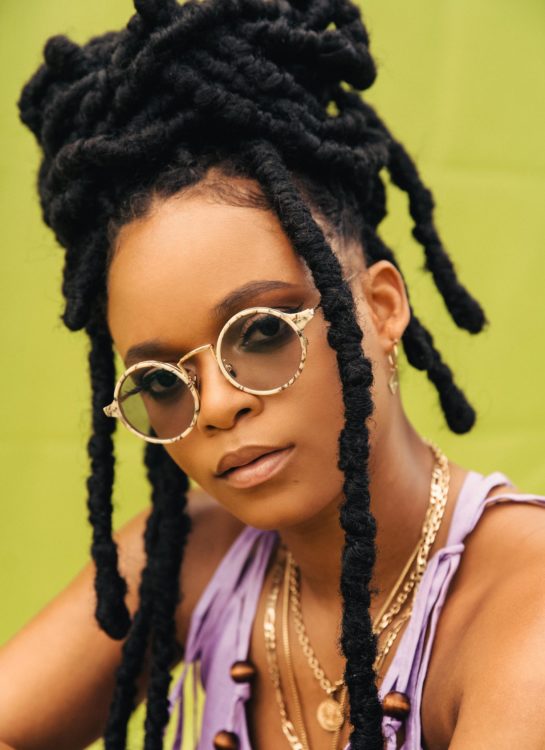
- Look Designed by Ayana Rivière
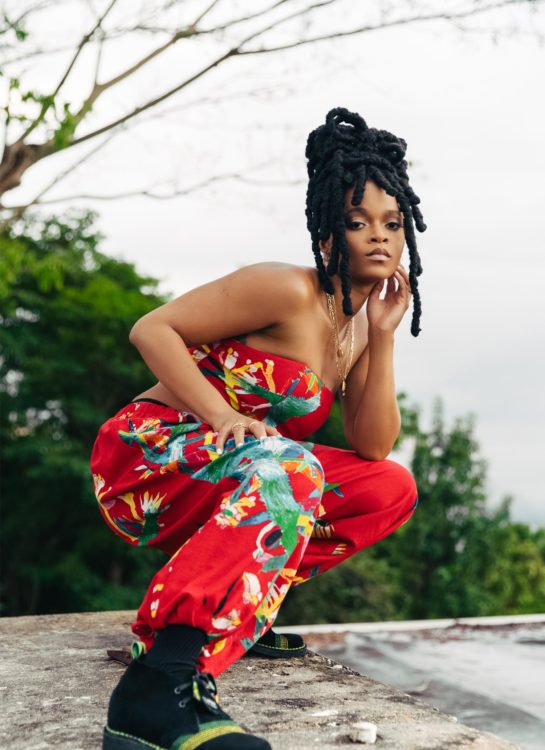
- Look Designed by Ayana Rivière
- Shoes Clarks Originals
Protoje: So you grew up in the country in Christiana… What role did music play in your life when you were younger?
Lila Iké: For me music was distraction and entertainment. Distraction in the sense that it helped me to not necessarily pay attention to a lot of what was happening around me, things that sometimes would stress me out even though I was pretty young. Entertainment in the same sense of the word — I used to spend a lot of time just listening to music because that was the only form of entertainment in our home. My mother never used to like putting on TV but she loved listening to music, so it began with just listening until I started listening really intensely to what was being played and what was being said in the song.
P: What kind of music was she heavy on in that time?
L: She listened to mostly reggae music, 90s reggae. I’d be hearing a lot of Garnett Silk, a lot of Sizzla Kalonji, Buju Banton. She’d mix in some dancehall too, Beenie Man, Bounty. She always liked listening to live recordings of dancehall sessions. What stood out to me the most about that is I could hear the point in a performance, or even the records that were being played, [where] you’d hear how people would react to certain songs. She listened to other music too — soul, R&B. She loved Whitney Houston and Celine Dion, Michael Jackson, Michael Bolton.
P: What artists and albums have influenced you to make the music you make today? I gather a lot of that comes from the same set of artists?
L: Yeah, for sure. I’d say almost all Garnett Silk songs that I’ve been exposed to have served to be some great inspiration for me, musically and personally too. I remember the first time I heard Lauryn Hill I was blown away just seeing a woman rapping like that.
P: Your first Lauryn Hill experience, was it a Fugees experience or was it a Miseducation experience?
L: I think the frst Lauryn Hill song was probably “Fu-Gee-La”. Then after that, you know ‘Strumming my pain with his fingers…’? [I was like] ‘Yo, it’s the same woman?!’ Those two artists, their songs make me into the artist that I am.
P: At what point along that journey did you first connect that ‘Hold on, I think I want to do this with my life now’?
L: Before I moved to Kingston music was something that I loved doing, something that I would think ‘This would be a really cool career’. But I wasn’t actively looking, like trying to be an artist. I just enjoyed making music. I’d say the point when I realised that this could be a thing would be when I moved to Kingston in 2015 or 16.
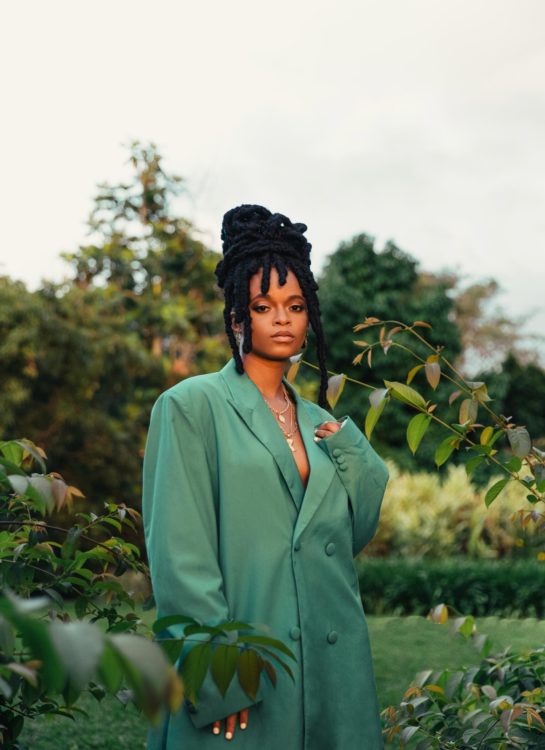
- Blazer Daily Paper
- Shoes Clarks Originals
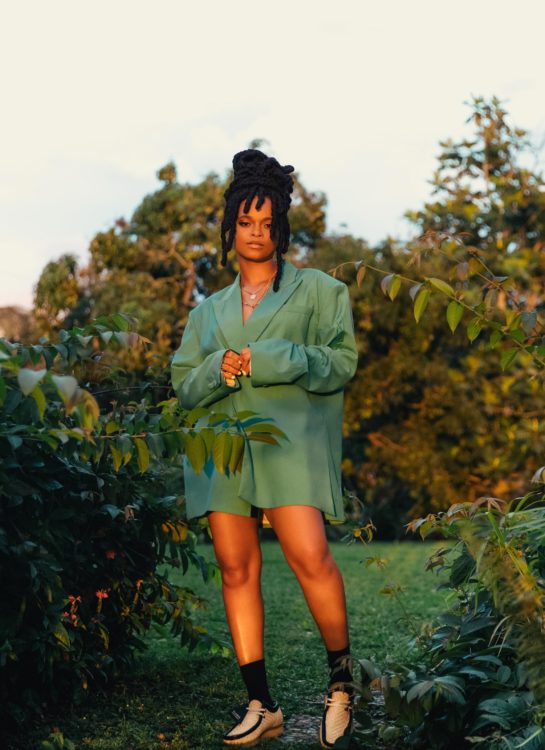
P: Was it something that you were unsure about? Probably not from a talent point, but from just a reality — ‘Is this going to happen for me?’
L: Interestingly enough I feel like I still go through that a little bit, even now with where I am. I’m pretty sure you’re aware of that! I’ll have bouts of just feeling like ‘Boy, is this really going to work?’ But I feel like it was between the point of meeting other musicians and creatives, young people like myself. I remember when I met Blvk H3ro and Runkus thinking ‘These people are seriously just into doing this’. And I remember feeling like I have to make sure that whatever I’m doing, I’m able to provide for myself. I have to be making money right now, so I am not trying to be a struggling artist. I just want to be making money and using that to support my career. Then I met others like Jah9; Jah9 is one of my biggest mentors. The music, the conversations we’d have, the books she put me on to reading… It was around that period I really started forming and shaping myself into being in this life professionally.
P: You used the word mentor — how important do you think it is for artists? And I guess, by extension, people coming up as professionals?
L: I think mentorship is extremely important, because what it offers is perspective and encouragement in the same breath. It’s easy to feel like I’m talented and I know what I’m doing; when I go out and I perform in front of a crowd, people are giving me the feedback that I need. It’s easy to get caught up in that ‘I know what I’m doing’. But having a mentor — somebody who has experienced that, great high points in their career [and has] also experienced doubts — having that extra voice to say: ‘Whatever you’re going through right now, I’ve been through it. This has been my approach, maybe this approach won’t work for you, but it’s something to think about…’ It’s like having a teacher. If mentors weren’t necessary then I’m pretty sure the educational system wouldn’t have teachers.
P: I think that people, whatever discipline, whatever vocation we choose, all learn the same things in our lives. I’m wondering what discipline has it taught you? What have you had to change about yourself, or qualities you have had to add to yourself, that makes you able to navigate your career? Were you less patient? Or whatever it is you found out is not going to be conducive to my career, so I’m going to have to fix it.
L: You mentioned patience — for me that’s definitely one of the more important and necessary things that I’ve learned to work on, because I can get extremely impatient. Whenever you begin to get into becoming a professional at whatever you do, or a master at whatever you do in life in general, it’s great to exercise patience. On a more personal note, I think becoming more present too. Understanding that I’m here at this point in my career because of things that I did in the past, you know? Observing that and understanding that the reason I’m not where I’d like to be is because a little bit more work is necessary, and that anything can happen at any point. Always remembering to be OK with where I’m at and be proud of myself, that kind of releases doubts and anxiety and fear.
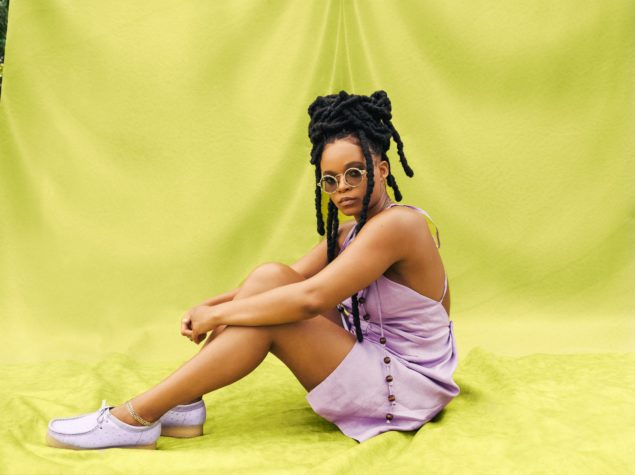
- Look Designed by Ayana Rivière
P: Present and patient, two words of quality. Have you found that helps you in your everyday life?
L: For sure. I feel like that’s the foundation and fundamental of it. It’s to apply to your personal life first and foremost, and then it filters out into you becoming great at whatever you’re doing once you have those locked in.
P: Again, awesome. What genres do you draw from the most when creating your own sound? And is the fusion of these sounds something that’s important to what you are going to put out?
L: I’d say the genre — even though I don’t necessarily believe in genres, but I guess for just conversational sake — that I draw from the most is definitely reggae music. Reggae has been conditioned into my subconscious, as it relates to my first reaction to any piece of music that I hear. I approach it from that point. Second to that would be between R&B and soul. I love music that’s chilled and laid-back and deep, and just gets you in that pensive mood. And naturally, dancehall music also. It’s a mixture of three of those genres mostly that I pour into my music. Then other times I listen to different music — I listen to soca sometimes, I listen to pop, Afrobeat. It’s very important to ensure that your sound is continuously being refined, and you grow on your sound to maintain that certain level of relevance.
P: We’ve heard the fusion a lot on ExPerience, that’s been out for almost a year. First, congrats on that release. What does it mean to you to see it do so well and people responding?
L: It gives me a lot of comfort in just being myself in music, not necessarily having to think that if I’m a part of In.Digg.Nation Collective with Protoje, there needs to be a certain level of whatever it is that you have in your music. It gives me a certain level of openness when creating and being comfortable and secure in whatever inspiration I get.
P: Let’s talk about new music — obviously we’ve gone through a year plus of lockdown since you were creating your last project. Now, in the space that you’re in, how is the music you’re making evolving?
L: How it has evolved is with the experience I’ve had with all the things I mentioned. It makes me a bit more comfortable in expressing and going deeper within myself as it relates to writing, and speaking about things that I probably wouldn’t want to put out there in the world. In the music that I’m making right now I’m a bit more grown. I’d like to think it’s more mature — not just lyrically, but even musically and my approach to singing.
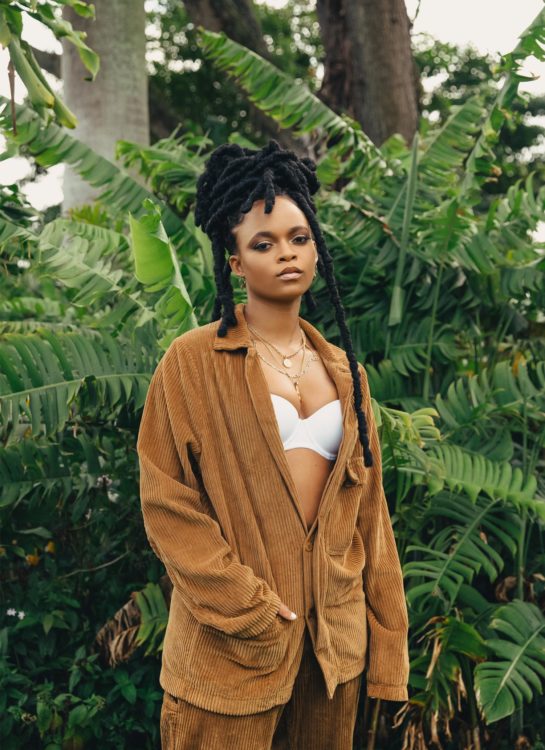
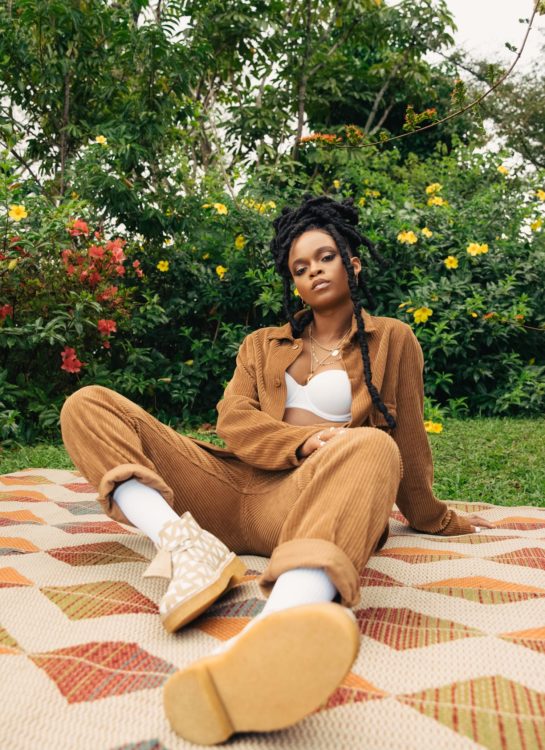
P: From your next single — “Batty Rider Shorts” — what can people expect?
L: That song is a song I’ve been working on for years, probably two or three years. It’s based on a personal experience that I had with the subject of the song — or one of the subjects, since it’s pretty broad. What people can expect is a certain level of realness and a refection of what’s actually happening right now as we speak in Jamaican society. It’s one more of those social commentary songs, I’d say it’s like the part two of “Thy Will”.
P: How do you want people to feel listening to your music?
L: I want each song to create a conversation. It can be a conversation between friends, a conversation among family members, a conversation among people who work in a particular space… And even if you can’t relate, you know for a fact that you know of somebody who has experienced whatever it is that I’m speaking about. I also want people to just be entertained. With my art, I want to generate a level of realness — I don’t want it to be imaginary music, just realness.
P: Sick. So you got with In.Digg in 2017 or 18. How has being part of the collective influenced you as an artist?
L: Musically, definitely the speed of growth. If I wasn’t signed to the label at the time that I did, I don’t think I would have excelled at the speed at which I did. Having somebody as experienced as you in music — with not just knowledge of how to make music, but also music history — having that ear in the studio is definitely something that is going to create music on a level that the production, the writing, everything is top notch even though it’s coming out as somebody that basically just came on the scene. And naturally, with that I also get to shadow somebody that’s really great and exceptional at what they do. Not just you, talking about Sevana, Jaz Elise. Also the dynamic of having male and female different perspectives in music. What me learn from you more than anything is organisation, and with Sevana her songwriting, her approach to singing. With Jaz Elise it’s her grasp of sound and how to sing, but it’s also refreshing to watch somebody grow in front of me and seeing her do these things that I used to do. It’s grounding and growth at the same time.
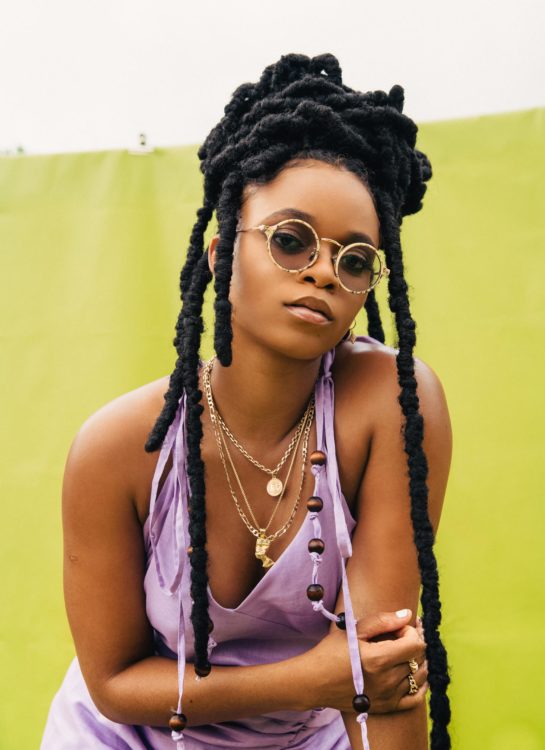
- Look Designed by Ayana Rivière
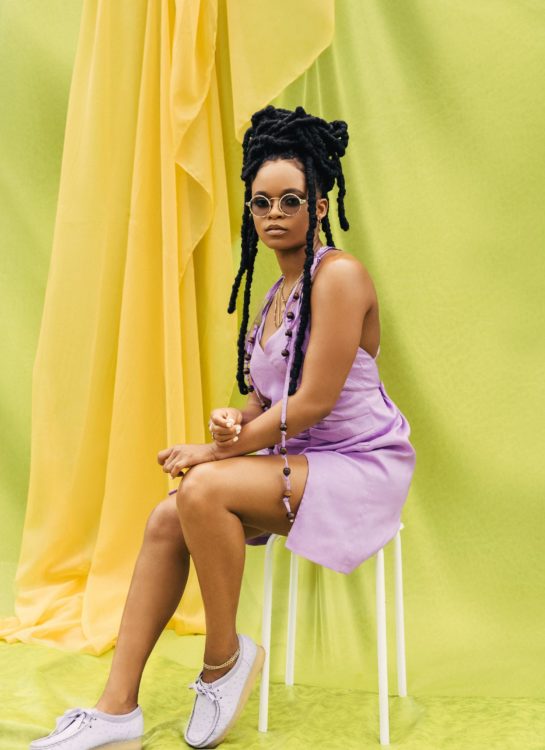
P: Very good answer. So talking about future stuff — when the world is back to some level of normality that we are all hoping for, what are you looking forward to the most?
L: Definitely playing music. I miss the big stage, hearing the bass line and the drums and the people, getting the mic tuned up, sound check… And with performing live just touring, experiencing different kinds of people. The thing for me with touring and travelling is that I feel like I experience inspiration in different strains. Different places bring me different vibes, and having that to tap into, you get to pour it into the music and the cycle continues.
P: I agree, I feel that. Who would be your dream collaboration and dream gig to play?
L: I’d love to do a song with Santan Dave from the UK. I’d love to do a show with Lauryn Hill.
P: What are you most proud of so far in your career?
L: I’m not necessarily big on accolades like that. But [from] 2016 or 17 when I first met you, fast-forward to 2021, I’m very proud of the growth spurt. What I’ve been able to accomplish within that time period. I remember us talking when you first met me, and you’d say: ‘I really see you have lot of potential’. Even then, I never completely understood or got what you saw. But for me to be able to play a show with you or open for you, or play the same stage and people know you and know my music — for me, that’s a really great thing. Just the growth and consistency.
P: We were both nominated for Reggae Artist of the Year for the MOBO Awards, and that’s one of the most prestigious awards in music for me in the UK. How did it feel to be nominated, and the fact that you were pulled up beside me?
L: It made me feel like I’m doing what I need to do, you know? I was just proud to be in that lineup with you, Popcaan, Koffee, Buju, who we can all agree are on the forefront of Jamaican music right now. So it felt amazing, it really did.
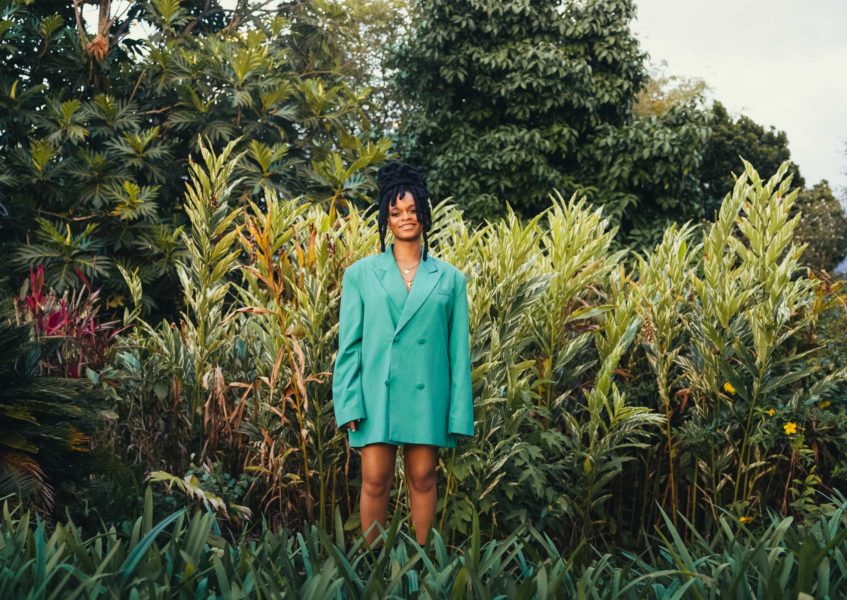
- Blazer Daily Paper
P: It was a really good moment, I felt really good to see you up there. Alright, so I know you’re very into playing chess. I wanted to ask you, if you could sit and have a game with somebody, anybody in the world — it doesn’t have to be a chess professional, but just in terms of their thinking — who would you like to have a face-off with around the chess board?
L: That’s a really good question. Dead or alive?
P: Dead or alive.
L: Probably Baltasar Gracián.
P: Very, very dope. How does your personality shine through in your game?
L: Oh, it’s very evident. I’m trying to take people out before 10 moves, you know? I’m always quick to attack.
P: And if you were one piece on the board, what piece are you and why?
L: I see myself through the queen, I really do. Being able to move through wherever, adapt to wherever. So much power.
P: How willing are you to sacrifice your queen for the good of the [game]? If you see that sacrificing your queen is the best play, are you still hesitant to do so?
L: Definitely. I’d be hesitant at first and observe, just make sure there’s no other play right now and I have to kill the queen. I feel invincible with the queen on the board. I have a certain level of attachment to the queen — I don’t know if it’s because it technically makes the game a little bit easier, or if it’s just the power that you feel having that. One question for Protoje: which piece are you?
P: You know me like the knight…
L: You underestimate the knight sometimes.


